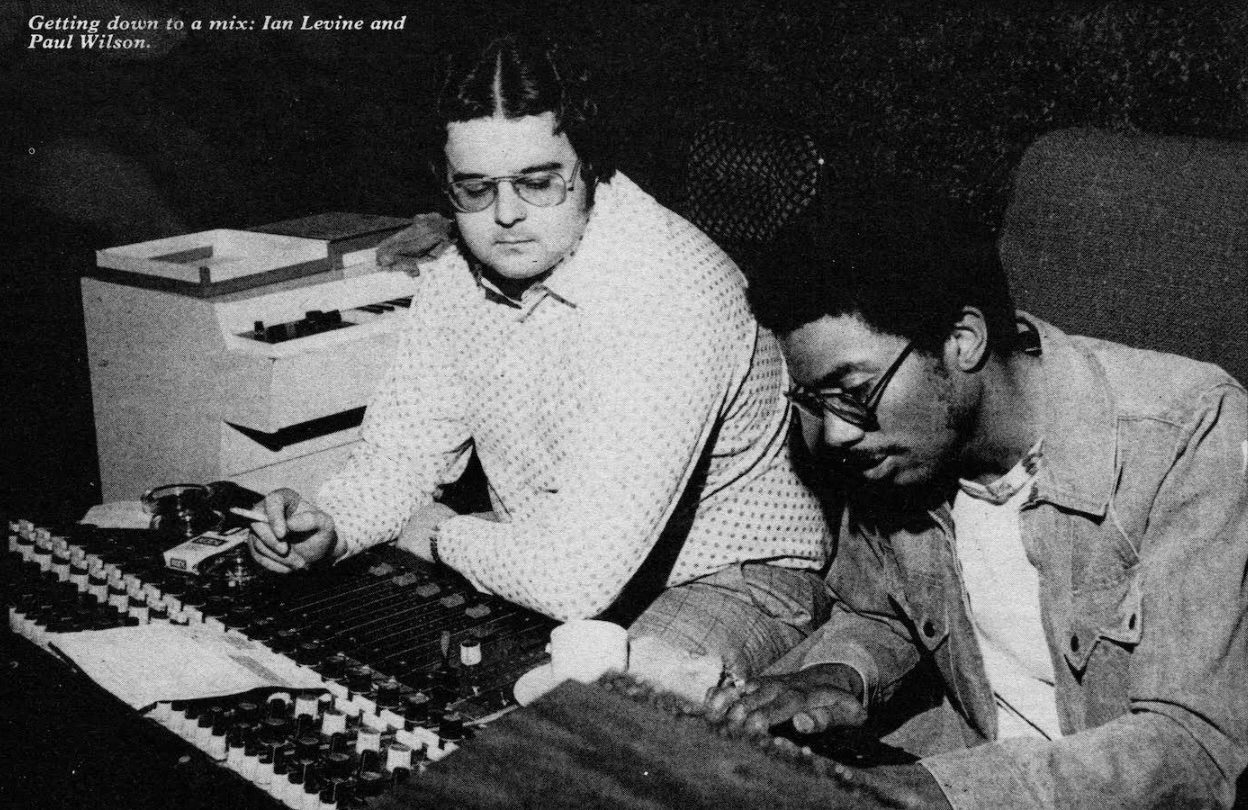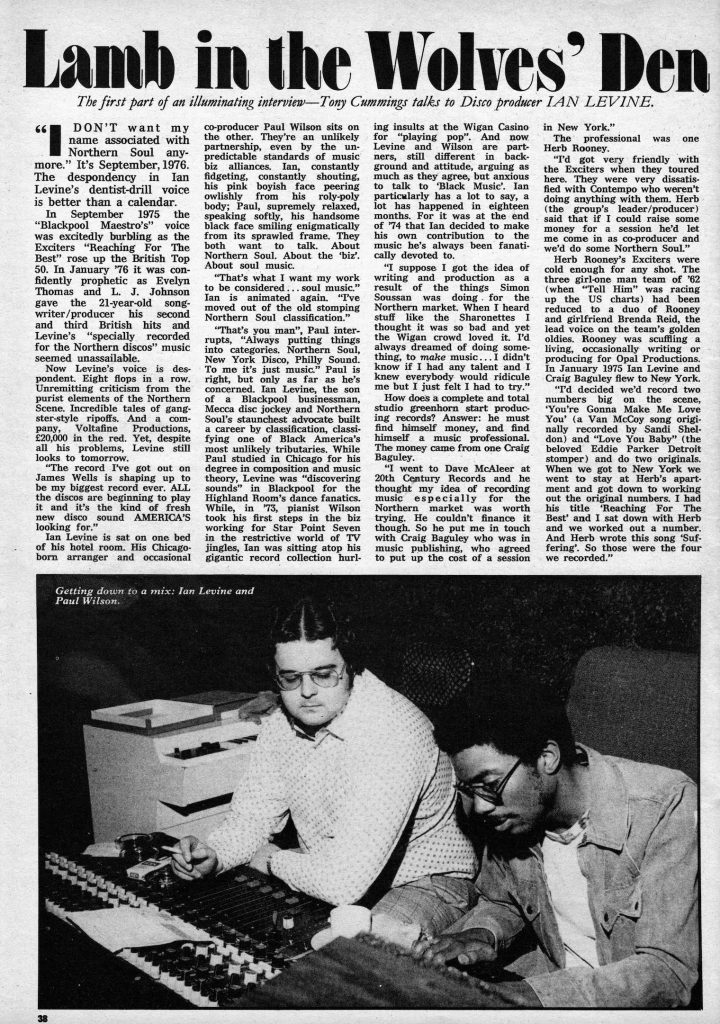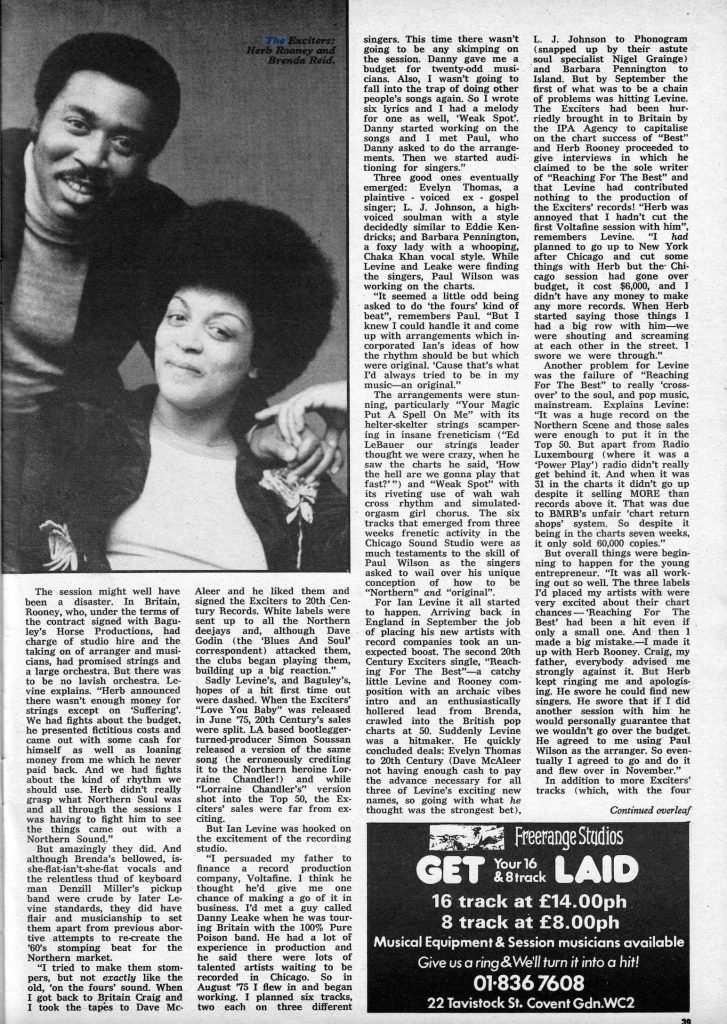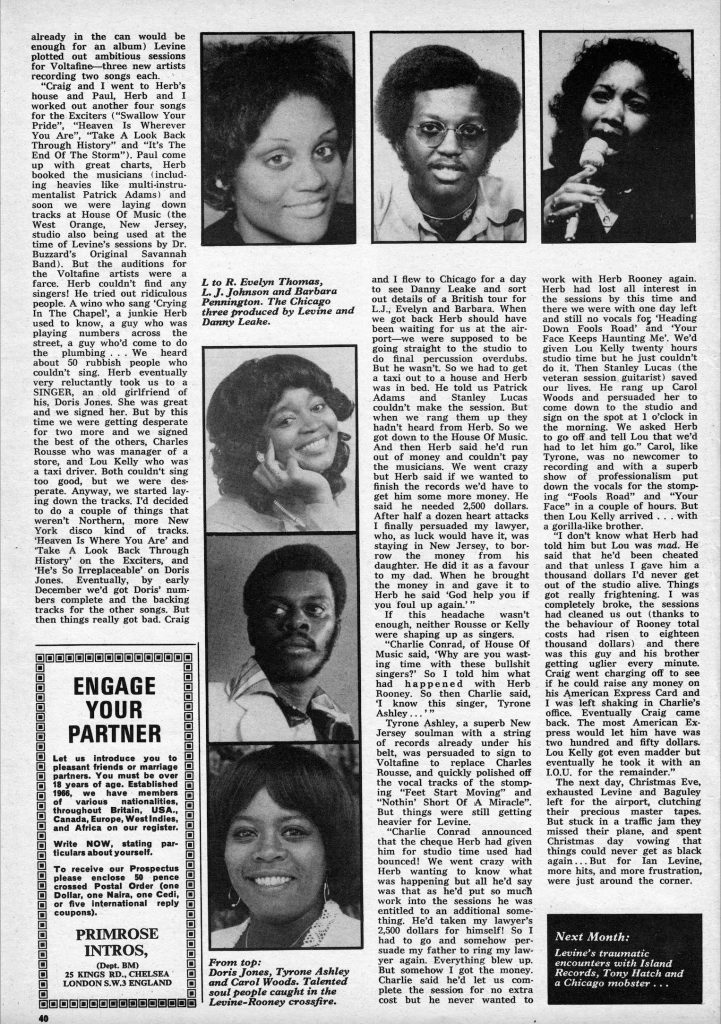OMiP / News / Featured News Item / The Rise of High Energy and Northern Soul: Ian Levine’s Early Influence
One Media News
The Rise of High Energy and Northern Soul: Ian Levine’s Early Influence
6 August 2024

Lamb in the Wolves’ Den
The first part of an illuminating interview—Tony Cummings talks to Disco producer IAN LEVINE.
“I DON’T want my name associated with Northern Soul anymore.” It’s September, 1976. The despondency in Ian Levine’s dentist-drill voice is better than a calendar.
In September 1975 the “Blackpool Maestro’s” voice was excitedly burbling as the Exciters “Reaching For The Best” rose up the British Top 50. In January ‘76 it was defiantly prophetic as Evelyn Thomas and L. J. Johnson gave the 21-year-old songwriter/producer his second and third British hits and Levine’s “specially recorded for the Northern discos” music seemed unassailable.
Now Levine’s voice is despondent. Eight flops in a row. Unremitting criticism from the purist elements of the Northern Scene. Incredible tales of gangster-style ripoffs. And a company, Voltafine Productions, £20,000 in red. Yet, despite all his problems, Levine still looks to tomorrow.
“The record I’ve got out on James Wells is shaping up to be my biggest record ever. ALL the discos are beginning to play it and it’s the kind of fresh new disco sound AMERICA’s looking for.”
Ian Levine sat on one bed of his hotel room. His Chicago-born arranger and occasional co-producer Paul Wilson sits on the other. They’re an unlikely partnership, even by the unpredictable standards of music biz alliances. Ian, constantly fidgeting, constantly shouting, his pink boyish face peering owlishly from his roly-poly body; Paul, supremely relaxed, speaking softly, his handsome black face smiling enigmatically from its sprawled frame. They don’t want to talk. About Northern Soul. About the ‘biz’. About soul music.
“That’s what I want my work to be considered… soul music.” Ian is animated again. “I’ve moved out of the old stomping Northern Soul classification.”
“That’s your man”, Paul interrupts, “Always putting things into categories. Northern Soul, New York Disco, Philly Sound. To me it’s just music.” Paul is right, but only as far as he’s concerned. Ian Levine, the son of a Blackpool businessman, Mecca disc jockey and Northern Soul’s staunchest advocate built a career by classification, classifying one of Black America’s most unlikely tributaries. While Paul studied in Chicago for his degree in composition and music theory, Levine was “discovering sounds” in Blackpool for the Highland Room’s dance fanatics. While, in ’73, pianist Wilson took his first steps in the biz working for Star Point Seven in the restrictive world of TV jingles, Ian was sitting atop his gigantic record collection hurling insults at the Wigan Casino for “playing pop”. And now Levine and Wilson are partners, still different in background and attitude, arguing as much as they agree, but anxious to talk to ‘Black Music’. Ian particularly has a lot to say, a lot has happened in eighteen months. For it was at the end of ‘74 that Ian decided to make his own contribution to the music he’s always been fanatically devoted to.
“I suppose I got the idea of writing and production as a result of the things Simon Soussan was doing for the Northern market. When I heard stuff like the Sharonettes I thought it was a bad and yet the Wigan crowd loved it. I’d always dreamed of doing something, to make music… I didn’t know if I had any talent and I knew everybody would ridicule me but I just felt I had to try.”
How does a complete and total studio greenhorn start producing records? Answer: he must find himself money, and find himself a music professional. The money came from one Craig Baguley.
“I went to Dave McAleer at 20th Century Records and he thought my idea of recording music especially for the Northern market was worth trying. He couldn’t finance it though. So he put me in touch with Craig Baguley who was in music publishing, who agreed to put up the cost of a session in New York.”
The professional was one Herb Rooney.
“I’d got very friendly with the Exciters when they toured here. They were very dissatisfied with Contempo who weren’t doing anything with them. Herb (the group’s leader/producer) said that if I could raise some money for a session he’d let me come in as a co-producer and we’d d some Northern Soul.”
Herb Rooney’s Exciters were cold enough for any shot. The three girl-one man team of ’62 (when “Tell Him” was racing up the US charts) had been reduced to a duo of Rooney and girlfriend Brenda Reid, the lead voice on the team’s golden oldies. Rooney was scuffling a living, occasionally writing or producing for Opal Productions. In January 1975 Ian Levine and Craig Baguley flew to New York.
“I’d decided we’d record two numbers big on the scene, ‘You’re Gonna Make Me Love You’ (a Van McCoy song originally recorded by Sandi Sheldon) and “Love You Baby” (the beloved Eddie Parker Detroit stomper) and do two originals. When we got to New York we went to stay at Herb’s apartment and got down to working out the original numbers. I had his title ‘Reaching For The Best’ and I sat down with Herb and we worked out a number. And Herb wrote this song ‘Suffering’. So those were the four we recorded.”
The session might well have been a disaster. In Britain, Rooney, who, under the terms of the contract signed with Baguley’s Horse Productions, had charge of studio hire and the taking on of arranger and musicians, had promised strings and a large orchestra. But there was to be no lavish orchestra. Levine explains. “Herb announced there wasn’t enough money for strings except on ‘Suffering’. We had fights about the budget, he presented fictitious costs and came out with some cash for himself as well as loaning money from me which he never paid back. And we had fights about the kind of rhythm we should use. Herb didn’t really grasp what Northern Soul was and all through the sessions I was having to fight him to see the things came out with a Northern Sound.”
But amazingly they did. And although Brenda’s bellowed, is-she-flat-isn’t-she-flat vocals and the relentless thud of keyboard man Denzill Miller’s pickup band were crude by later Levine standards, they did have flair and musicianship to set them apart from previous abortive attempts to re-create the ’60’s stomping beat for the Northern market.
“I tried to make them stompers, but not exactly like the old, ‘on the fours’ sound. When I got back to Britain Craig and I took the tapes to Dave McAleer and he liked them and signed the Exciters to 20th Century Records. White labels were sent up to all the Northern deejays and, although Dave Godin (the ‘Blues And Soul’ correspondent) attacked them, the clubs began playing them, building up a big reaction.”
Sadly Levine’s, and Baguley’s, hopes of a hit first time out were dashed. When the Exciters’ “Love You Baby” was released in June ’75, 20th Century’s sales were split. LA based bootlegger-turned-producer Simon Soussan released a version of the same song (he erroneously crediting it to the Northern heroine Lorraine Chandler!) and while “Lorraine Chandler’s” version shot into the Top 50, the Exciters’ sales were far from exciting.
But Ian Levine was hooked on the excitement of the recording studio.
“I persuaded my father to finance a record production company, Voltafine. I think he thought he’d give me one chance of making a go of it in business. I’d met a guy called Danny Leake when he was touring Britain with the 100% Pure Poison band. He had a lot of experience in production and he said there were lots of talented artists waiting to be recorded in Chicago. So in August ‘75 I flew in and began working. I planned six tracks, two each on three different singers. This time there wasn’t going to be any skimping on the session. Danny gave me a budget for twenty-odd musicians. Also, I wasn’t going to fall into the trap of doing other people’s songs again. So I wrote six lyrics and I had a melody for one as well, ‘Weak Spot’. Danny started working on the songs and I met Paul, who Danny asked to do the arrangements. Then we started auditioning for singers.”
Three good ones eventually emerged: Evelyn Thomas, a plaintive-voiced ex-gospel singer; L. J Johnson, a high-voiced soulman with a style decidedly similar to Eddie Kendricks; and Barbara Pennington, a foxy lady with a whooping, Chaka Khan vocal style. While Levine and Leake were finding the singers, Paul Wilson was working on the charts.
“It seemed a little odd being asked to do ‘the fours’ kind of beat”, remembers Paul. “But I knew I could handle it and come up with arrangements which incorporated Ian’s ideas of how the rhythm should be but which were original. ‘Cause that’s what I’d always tried to be in my music–an original.”
The arrangements were stunning, particularly “Your Magic Put A Spell On Me” with its helter-skelter strings scampering in insane freneticism (“Ed LeBauer our strings leader thought we were crazy, when he saw the charts he said, ‘How the hell are we gonna play that fast?’”) and “Weak Spot” with its riveting use of wah wah cross rhythm and simulated-orgasm girl chorus. The six tracks that emerged from three weeks frenetic activity in the Chicago Sound Studio were as much testaments to the skill of Paul Wilson as the singers asked to wail over his unique conception of how to be “Northern” and “original”.
For Ian Levine it all started to happen. Arriving back in England in September the job of placing his new artists with record companies took an unexpected boost. The second 20th Century Exciters single, “Reaching For The Best”–a catchy little Levine and Rooney composition with an archaic vibes intro and an enthusiastically hollered lead from Brenda, crawled into the British pop charts at 50. Suddenly Levine was a hitmaker. He quickly concluded deals: Evelyn Thomas to 20th Century (Dave McAleer not having enough cash to pay the advance necessary for all three of Levine’s exciting new names, so going with what he thought was the strongest bet), L. J. Johnson to Phonogram (snapped up by their astute soul specialist Nigel Grainge) and Barbara Pennington to Island. But by September the first of what was to be a chain of problems was hitting Levine. The Exciters had been hurriedly brought in to Britain by the IPA Agency to capitalise on the chart success of “Best” and Herb Rooney proceeded to give interviews in which he claimed to be the sole writer of “Reaching For The Best” and that Levine had contributed nothing to the production of the Exciters’ records! “Herb was annoyed that I hadn’t cut the first Voltafine session with him”, remembers Levine. “I had planned to go up to New York after Chicago and cut some things with Herb but the Chicago session had gone over budget, it cost $6,000, and I didnt have any money to make any more records. When Herb started saying those things I had a big row with him–we were shouting and screaming at each other in the Street. I swore we were through.”
Another problem for Levine was the failure of “Reaching For The Best” to really ‘crossover’ to the soul, and pop music, mainstream. Explains Levine: “It was a huge record on the Northern Scene and those sales were enough to put it in the Top 50. But apart from Radio Luxembourg (where it was a ‘Power Play’) radio didn’t really get behind it. And when it was 31 in the charts it didn’t go up despite it selling MORE than records above it. That was due to BMRB’s unfair ‘chart return shops’ system. So despite it being in the charts seven weeks, it only sold 60,000 copies.”
But overall things were beginning to happen for the young entrepreneur. “It was all working out so well. The three labels I’d placed my artists with were very excited about their chart chances– ‘Reaching For The Best’ had been a hit even if only a small one. And then I made a big mistake. –I made it up with Herb Rooney. Craig, my father, everybody advised me against it. But Herb kept ringing me and apologising. He swore he could find new singers. He swore that if I did another session with him he would personally guarantee that we wouldn’t go over the budget. He agreed to me using Paul Wilson as the arranger. So eventually I agreed to go and do it and flew over in November.”
In addition to more Exciters’ tracks (which, with the four already in the can would be enough for an album) Levine plotted out ambitious sessions for Voltafine–three new artists recording two songs each.
“Craig and I went to Herb’s house and Paul, Herb and I worked out another four songs for the Exciters (“Swallow Your Pride”, “Heaven Is Wherever You Are”, “Take A Look Back Through History” and “It’s The End Of The Storm”). Paul come up with great charts, Herb booked the musicians (including heavies like multi-instrumentalist Patrick Adams) and soon we were laying down tracks at House of Music (the West Orange, New Jersey, studio also being used at the time of Levine’s sessions by Dr. Buzzards Original Savannah Band). But the audition for the Voltafine artists were a farce. Herb couldn’t find any singers! He tried out ridiculous people. A wino who sang ‘Crying In The Chapel’, a junkie Herb used to know, a guy who was playing numbers across the street, a guy who’d come to do the plumbing … We heard about 50 rubbish people who couldn’t sing. Herb eventually very reluctantly took us to a SINGER, an old girlfriend of his, Doris Jones. She was great and we signed her. But by this time we were getting desperate for two more and we signed the best of the others, Charles Rousse who was manager of a store, and Lou Kelly who was a taxi driver. Both couldn’t sing too good, but we were desperate. Anyway, we started laying down the tracks. I’d decided to do a couple of things that weren’t Northern, more New York disco kind of tracks. ‘Heaven Is Where You Are’ and ‘Take a Look Back Through History’ on the Exciters, and ‘He’s So Irreplaceable’ on Doris Jones. Eventually, by early December we’d got Doris’ numbers complete and the backing tracks for the other songs. But then things got really bad. Craig and I flew to Chicago for a day to see Dany Leake and sort out details of a British tour for L.J., Evelyn and Barbara. When we got back Herb should have been waiting for us at the airport–we were supposed to be going straight to the studio to do final percussion overdubs. But he wasn’t. So we had to get a taxi out to a house and Herb was in bed. He told us Patrick Adams and Stanley Lucas couldn’t make the session. But when we rang them up they hadn’t heard from Herb. So we got down to the House of Music. And then Herb said he’d run out of money and couldn’t pay the musicians. We went crazy but Herb said if we wanted to finish the records we’d have to get him some more money. He said he needed 2,500 dollars. After a dozen heart attacks I finally persuaded my lawyer, who, as luck would have it, was staying in New Jersey, to borrow the money from his daughter. He did it as a favour to my dad. When he brought the money in and gave it to Herb he said ‘God help you if you foul this up again.’”
If this headache wasn’t enough, neither Rousse or Kelly were shaping up as singers.
“Charlie Conrad, of House Of Music said, ‘Why are you wasting time with these bullshit singers?’ So I told him what had happened with Herb Rooney. So then Charlie said, ‘I know this singer, Tyrone Ashley…’”
Tyrone Ashley, a superb New Jersey soulman with a string of records already under his belt, was persuaded to sign to Voltafine to replace Charles Rousse, and quickly polished off the vocal tracks of the stomping “Feet Start Moving” and “Nothin’ Short Of A Miracle”. But things were still getting heavier for Levine.
“Charlie Conrad announced that the cheque Herb had given him for studio time had bounced! We went crazy with Herb wanting to know what was happening but all he’d say was that as he’d put so much work into the sessions he was entitled to an additional something. He’d taken my lawyers 2,500 dollars for himself! So I had to go and somehow persuade my father to ring my lawyer again. Everything blew up. But somehow I got the money. Charlie said he’d let us complete the session for no extra cost but he never wanted to work with Herb Rooney again. Herb had lost all interest in the sessions by this time and there we were with one day left and still no vocals for ‘Heading Down Fools Road’ and ‘Your Face Keeps Haunting Me’. We’d given Lou Kelly twenty hours studio time but he just couldn’t do it. Then Stanley Lucas (the veteran session guitarist) saved our lives. He rang up Carol Woods and persuaded her to come down to the studio and sign on the spot at 1 o’clock in the morning. We asked Herb to go off and tell Lou that we’d had to let him go.” Carol, like Tyrone, was no newcomer to recording and with a superb show of professionalism put down the vocals for the stomping “Fools Road” and “Your Face” in a couple of hours. But then Lou Kelly arrived…with a gorilla-like brother.
“I don’t know what Herb had told him but Lou was mad. He said that he’d been cheated and that unless I gave him a thousand dollars I’d never get out of the studio alive. Things got really frightening. I was completely broke, the sessions had cleaned us out (thanks to the behaviour of Rooney total costs had risen to eighteen thousand dollars) and there was this guy and his brother getting uglier every minute. Craig went charging off to see if he could raise any money on his American Express Card and I was left shaking in Charlie’s office. Eventually Craig came Back. The most American Express would let him have was two hundred and fifty dollars. Lou Kelly got even madder but eventually he took it with an I.O.U for the remainder.”
The next day, Christmas Eve, exhausted Levine and Baguley left for the airport, clutching their precious master tapes. But stuck in a traffic jam they missed their plane, and spent Christmas day vowing that things could never get as black again… But for Ian Levine, more hits, and more frustration, were just around the corner.



